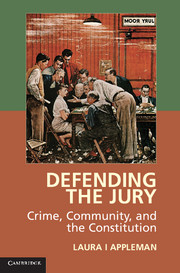Book contents
- Frontmatter
- Contents
- Acknowledgments
- 1 Introduction
- Part I History in the Crucible: Rediscovering the Original Community Right in Criminal Justice
- Part II Old Becomes New: Sixth Amendment Jury Rights and Twenty-First-Century Criminal Procedure
- 4 Retribution, Restorative Justice, and the Sixth Amendment Jury Right
- 5 Defining Community in the Twenty-First Century: Cities, Counties, and Collective Action
- Part III Theory into Practice: Origins and Community in Modern Criminal Procedure
- Selected Bibliography
- Index
- References
4 - Retribution, Restorative Justice, and the Sixth Amendment Jury Right
Published online by Cambridge University Press: 05 April 2015
- Frontmatter
- Contents
- Acknowledgments
- 1 Introduction
- Part I History in the Crucible: Rediscovering the Original Community Right in Criminal Justice
- Part II Old Becomes New: Sixth Amendment Jury Rights and Twenty-First-Century Criminal Procedure
- 4 Retribution, Restorative Justice, and the Sixth Amendment Jury Right
- 5 Defining Community in the Twenty-First Century: Cities, Counties, and Collective Action
- Part III Theory into Practice: Origins and Community in Modern Criminal Procedure
- Selected Bibliography
- Index
- References
Summary
What are the jurisprudential underpinnings of the Court’s recent jury trial right expansion? Over the past fifteen years, the Supreme Court has rethought its approach to the constitutional rights and requirements of the community jury. Despite this shift, however, it has left only a few clues as to why it has done so, apart from some historical references and incomplete sourcing. Thus the question remains: What, if any, theory of punishment underlies this major change to criminal justice?
In this chapter, I argue that the Court’s championing of the criminal jury trial right is undergirded by a philosophy of punishment based on a type of expressive, restorative retribution. This theory of punishment is grounded both in the historical right of the community to decide all punishments and in the necessity of having community make decisions about blameworthiness. Expressive, restorative retribution not only helps clarify why the Court has become such a champion of the Sixth Amendment jury trial right at a time when most indictments are settled through guilty pleas, but also provides the best explanation of the Court’s new jurisprudence of punishment.
Using expressive, restorative retribution as a blueprint allows us to predict and expand the use of the community as arbiter of punishment beyond trials to other forms of criminal process such as guilty pleas, bench trials, bail hearings, and ancillary sentencing – as I explore later in the book. In this chapter, I delve into the theory underlying both the Court’s understanding of the Sixth Amendment jury trial right and the historical contours of colonial punishment and forgiveness upon which our criminal justice system is based.
- Type
- Chapter
- Information
- Defending the JuryCrime, Community, and the Constitution, pp. 53 - 69Publisher: Cambridge University PressPrint publication year: 2015



